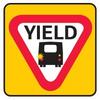VIDEO - Truck Underride: A Hazard Hidden in Plain View
 Colliding with the rear or side of a commercial vehicle can be more than a headache. Currently North American standards have required a stronger rear underride protection, but there is no requirement at all for side underride protection. This video illustrates the hazard and demonstrates the added protection for side underride protection currently mandated in Europe.
Colliding with the rear or side of a commercial vehicle can be more than a headache. Currently North American standards have required a stronger rear underride protection, but there is no requirement at all for side underride protection. This video illustrates the hazard and demonstrates the added protection for side underride protection currently mandated in Europe.

 This case decides liability after a collision between a cyclist and a large commercial truck. Christina MacEachern was riding or walking beside a bicycle along the King George Highway in Surrey, B.C. She was opposing traffic on the shoulder of the roadway which was narrow due to vehicles parked next to it.
This case decides liability after a collision between a cyclist and a large commercial truck. Christina MacEachern was riding or walking beside a bicycle along the King George Highway in Surrey, B.C. She was opposing traffic on the shoulder of the roadway which was narrow due to vehicles parked next to it. The other day I was following a bus. He put on his four way flashers and pulled completely off the road into a bus stop, so I proceeded to pass. When I was beside the bus, he pulled out and I had to swerve to avoid a collision. They do have a yield sign on the back of the bus, but don't they have to re-enter traffic yielding just like anyone else on the road?
The other day I was following a bus. He put on his four way flashers and pulled completely off the road into a bus stop, so I proceeded to pass. When I was beside the bus, he pulled out and I had to swerve to avoid a collision. They do have a yield sign on the back of the bus, but don't they have to re-enter traffic yielding just like anyone else on the road?
 The Ministry of Transportation and Infrastructure's Commercial Vehicle Safety and Enforcement (CVSE) branch as issued a publication titled "Your Guide to Livestock Hauling, An Overview of Trailer Licensing and Insurance." In addition to a discussion of licensing and insurance, the publication also provides information on how the National Safety Code applies to farm vehicle operations and whether or not a farm vehicle must report to weigh scales.
The Ministry of Transportation and Infrastructure's Commercial Vehicle Safety and Enforcement (CVSE) branch as issued a publication titled "Your Guide to Livestock Hauling, An Overview of Trailer Licensing and Insurance." In addition to a discussion of licensing and insurance, the publication also provides information on how the National Safety Code applies to farm vehicle operations and whether or not a farm vehicle must report to weigh scales. In Vehicle Safety and Standards Bulletin #03-10 dated September 24, 2010 Commercial Vehicle Safety and Enforcement (CVSE) announces that a change in stance on automatic slack adjusters. Effective August 30, 2012 all air brake equipped vehicles built after May 31, 1996 must be equipped with automatic slack adjusters in order to pass provincial inspection.
In Vehicle Safety and Standards Bulletin #03-10 dated September 24, 2010 Commercial Vehicle Safety and Enforcement (CVSE) announces that a change in stance on automatic slack adjusters. Effective August 30, 2012 all air brake equipped vehicles built after May 31, 1996 must be equipped with automatic slack adjusters in order to pass provincial inspection. Commercial Truck and Bus Safety Synthesis Program (CTBSSP) Synthesis 18: Older Commercial Drivers: Do They Pose a Safety Risk? explores age-related changes in the basic functional abilities needed to drive safely. The report is designed to help assist industry and labor practitioners in promoting safer commercial operations.
Commercial Truck and Bus Safety Synthesis Program (CTBSSP) Synthesis 18: Older Commercial Drivers: Do They Pose a Safety Risk? explores age-related changes in the basic functional abilities needed to drive safely. The report is designed to help assist industry and labor practitioners in promoting safer commercial operations. Many Canadian drivers do not believe driver training programs for passenger vehicles provide adequate education about sharing the road with large trucks.
Many Canadian drivers do not believe driver training programs for passenger vehicles provide adequate education about sharing the road with large trucks. Question: I just got home from my week of driving and today I received a ticket for "Slow Driving" which I don't understand or agree with.
Question: I just got home from my week of driving and today I received a ticket for "Slow Driving" which I don't understand or agree with.
 The European Transport Safety Council has released the first of it's thematic reports in the PRAISE series asking the question "How can in-vehicle safety equipment improve road safety at work?"
The European Transport Safety Council has released the first of it's thematic reports in the PRAISE series asking the question "How can in-vehicle safety equipment improve road safety at work?"  Perhaps one of the more difficult aspects of driving is taking responsibility for your actions when you drive your vehicle or your employer's vehicle. We tend to sit anonymously in the confines of the passenger compartment and not feel obligated to exercise our social manners toward the other unfamiliar drivers around us.
Perhaps one of the more difficult aspects of driving is taking responsibility for your actions when you drive your vehicle or your employer's vehicle. We tend to sit anonymously in the confines of the passenger compartment and not feel obligated to exercise our social manners toward the other unfamiliar drivers around us.